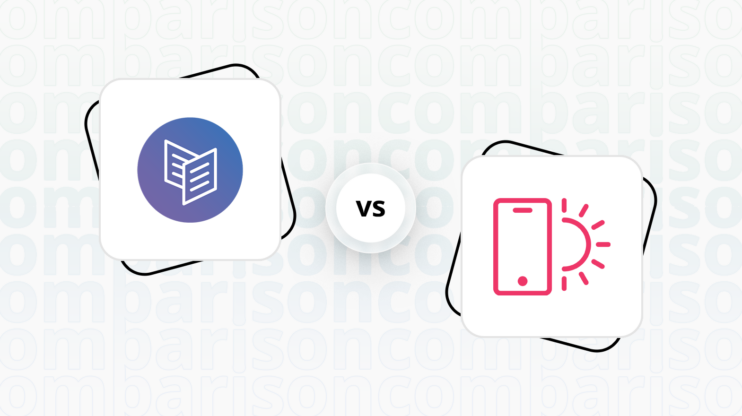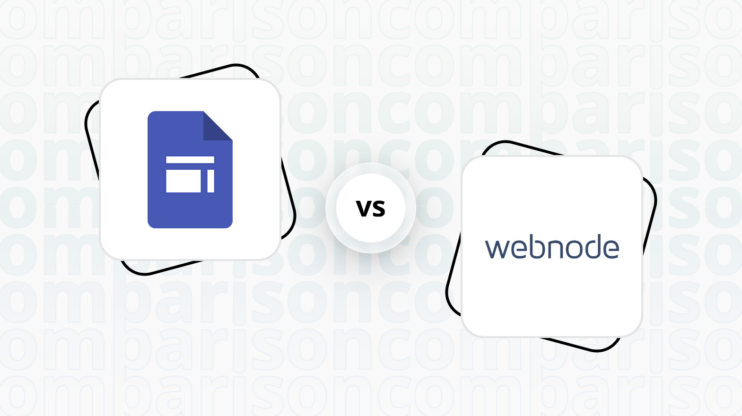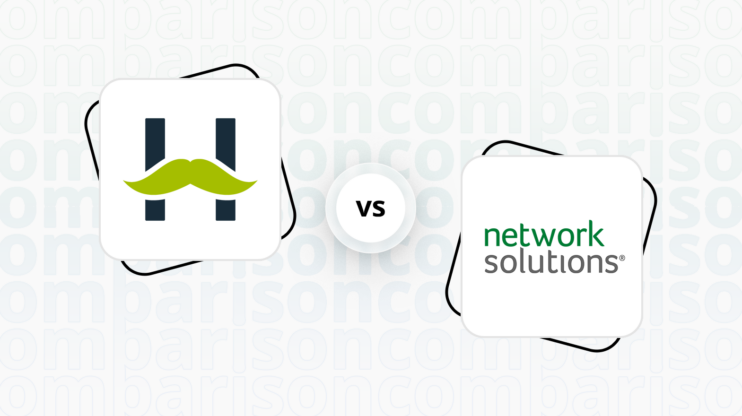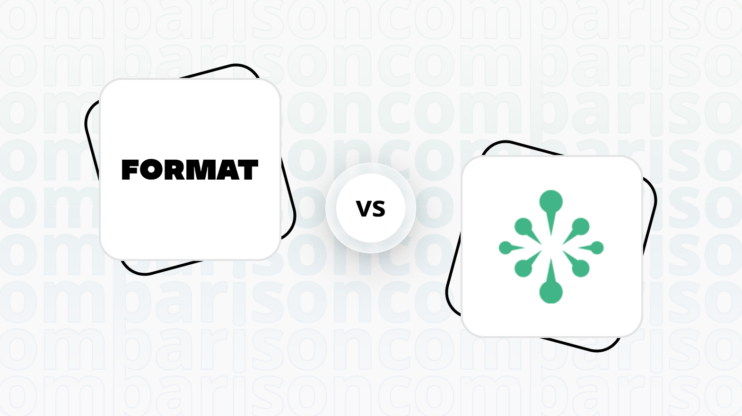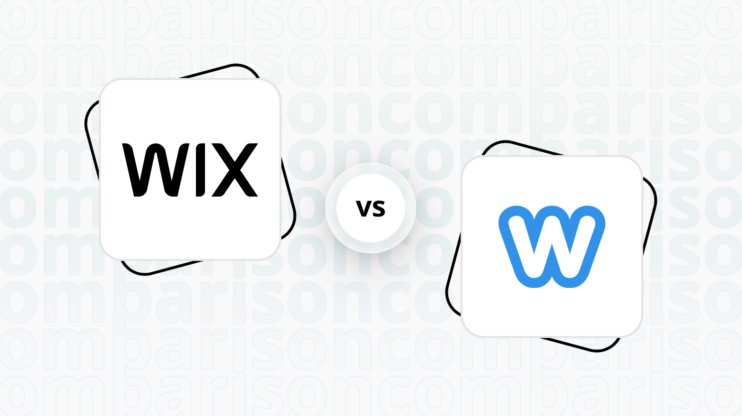iPage vs Tilda: Final verdict
iPage and Tilda both offer unique strengths, catering to different user needs and preferences.
-
iPage (Overall Grade: 6.1/10)
is a user-friendly web hosting and site builder platform, ideal for small businesses and personal projects. It offers comprehensive services, including hosting, domain registration, and e-commerce solutions. iPage excels in hosting quality, website speed optimization, and customer support. However, it falls short in design functionalities, ecommerce features, and AI capabilities. When comparing iPage vs Tilda, iPage is a solid choice for users seeking affordable hosting and basic website building tools. -
Tilda (Overall Grade: 6.7/10)
stands out with its focus on typography and visual content, making it suitable for bloggers, small businesses, and digital marketers. Tilda offers a wide range of pre-designed blocks and templates, robust ecommerce features, and a user-friendly interface. It excels in design functionalities, ease of use, and plugins and integrations. However, it has limitations in hosting quality and customer support. Considering iPage vs Tilda, Tilda is ideal for users who prioritize design flexibility and visual appeal.

|

|
|
|---|---|---|
|
Design functionalities & templates |
7.0 |
8.6 |
|
Ease of use |
7.6 |
8.0 |
|
Ecommerce |
5.7 |
7.2 |
|
Website Editors |
6.8 |
8.0 |
|
Product testing options |
2.5 |
5.9 |
|
Price |
7.3 |
8.0 |
|
Hosting quality |
7.7 |
6.2 |
|
Website speed optimization |
7.4 |
4.9 |
|
Plugins and integrations |
6.3 |
7.6 |
|
Marketing features |
7.2 |
6.9 |
|
Customer support |
6.9 |
5.5 |
|
Security |
7.5 |
7.6 |
|
AI capabilities |
3.0 |
2.1 |
|
User Management |
3.2 |
7.3 |
Which one is the best for ecommerce: iPage or Tilda?
 5.7
5.7
 7.2
7.2
Verdict
: Tilda outperforms iPage in ecommerce capabilities, making it a better choice for those looking to create and manage online stores with more advanced features and customization options.
-
iPage
: iPage offers a user-friendly platform with essential ecommerce features suitable for small businesses and personal projects. It includes inventory management, coupon codes, SEO tools, and PayPal integration. However, when comparing iPage vs Tilda, iPage falls short in advanced customization and lacks some of the more robust ecommerce functionalities that Tilda provides. -
Tilda
: Tilda excels in providing a versatile and visually appealing platform for creating online stores. It offers a wide range of pre-designed blocks and templates, product catalogs, payment gateways, and built-in CRM and marketing tools. Tilda’s focus on typography and visual content makes it ideal for users looking to create professional-looking websites without coding skills.
Which one is the best for informational and business websites?
 7.2
7.2
 8.4
8.4
Verdict
: Tilda is the superior choice for creating visually appealing and professional-looking informational websites, while iPage offers a solid, user-friendly platform with comprehensive hosting services.
-
iPage
: iPage is a user-friendly web hosting and site builder platform that simplifies website creation for those without technical expertise. It offers a variety of templates and a drag-and-drop builder, making it suitable for small businesses and personal projects. However, its design options may feel limited compared to Tilda. iPage scores 7.2 in this category. -
Tilda
: Tilda excels in creating visually appealing websites with its wide range of pre-designed blocks and templates. It focuses on typography and visual content, making it ideal for bloggers, small businesses, and digital marketers. Tilda’s intuitive interface and robust set of features make it a user-friendly choice for website creation. Tilda scores 8.4 in this category.
iPage vs Tilda: Detailed comparison
Design functionalities & templates
Design FunctionalitiesRepresents how well each platform allows for creative design and customization of websites.Score Components:
- Template Variety (30%): Range and quality of design templates.
- Customization (30%): Flexibility and options for design alterations.
- User Interface (20%): Ease and intuitiveness of the design process.
- Responsiveness (10%): Adaptability to different devices and screen sizes.
- Innovation (10%): Unique design features and tools.
 7.0
7.0
 8.6
8.6
Winner: Tilda.
Tilda offers a wider range of design functionalities and templates, scoring 8.6 compared to iPage’s 7.0.
iPage offers a wide variety of templates and designs, catering to users with diverse needs and preferences. With hundreds of options available, users can easily find a template that suits their specific project or business requirements. These templates are also customizable, allowing for a high degree of personalization.
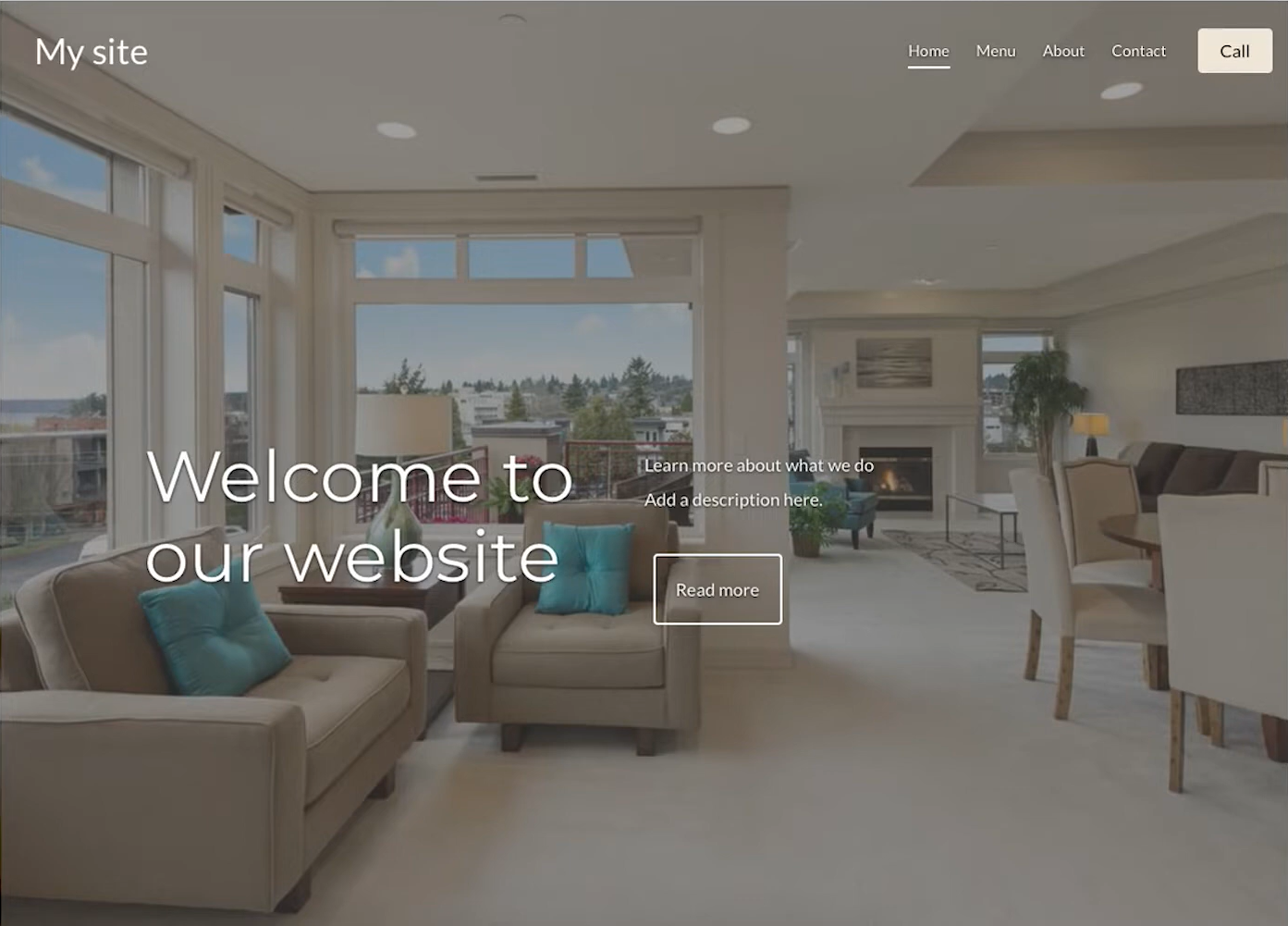
On the other hand, Tilda offers a diverse selection of design templates that are suitable for various types of content, all crafted by professional designers. These templates emphasize gorgeous typography, minimalist blocks, and striking images. Users have the flexibility to modify any template significantly or even start from scratch, ensuring the final website can meet a wide range of design preferences and requirements.
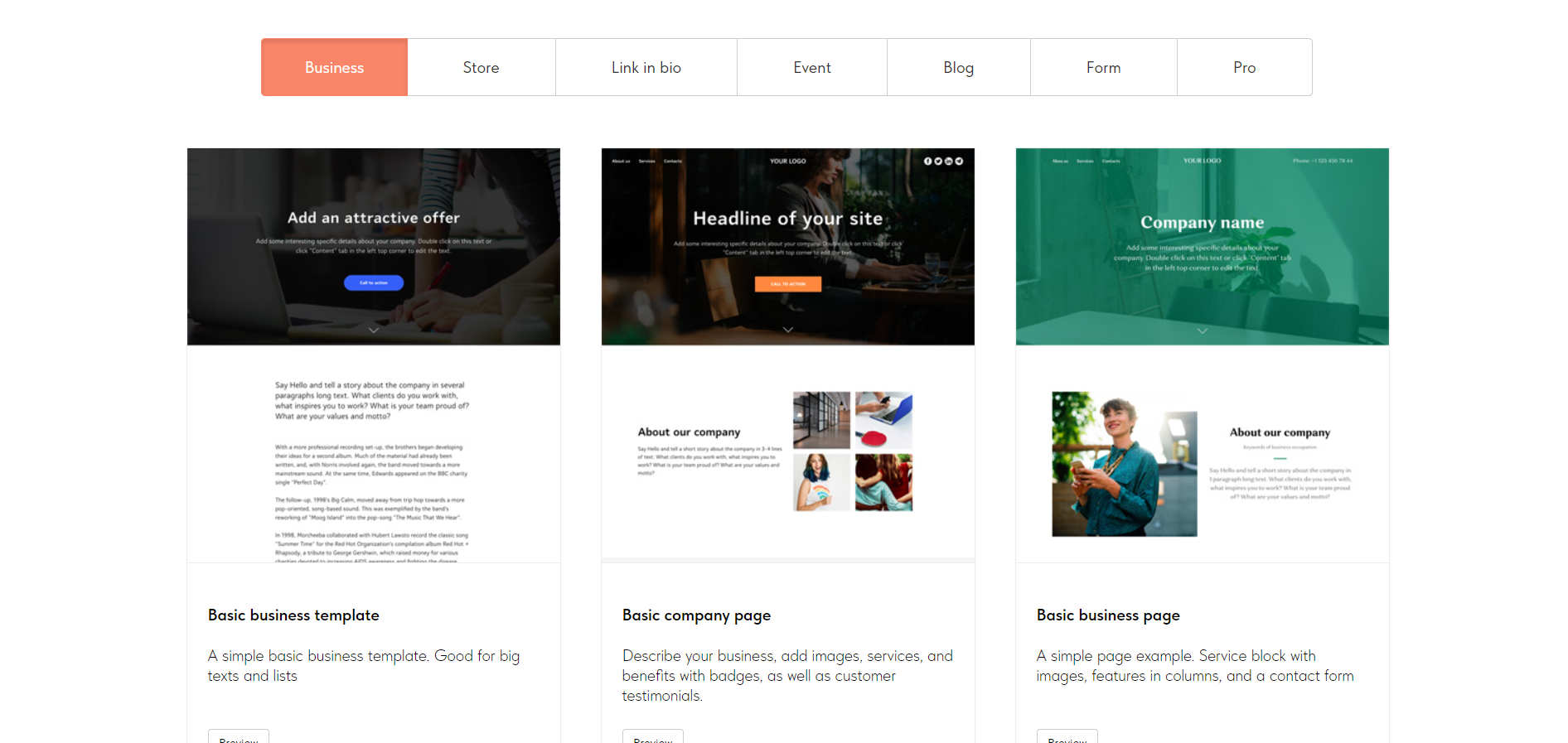
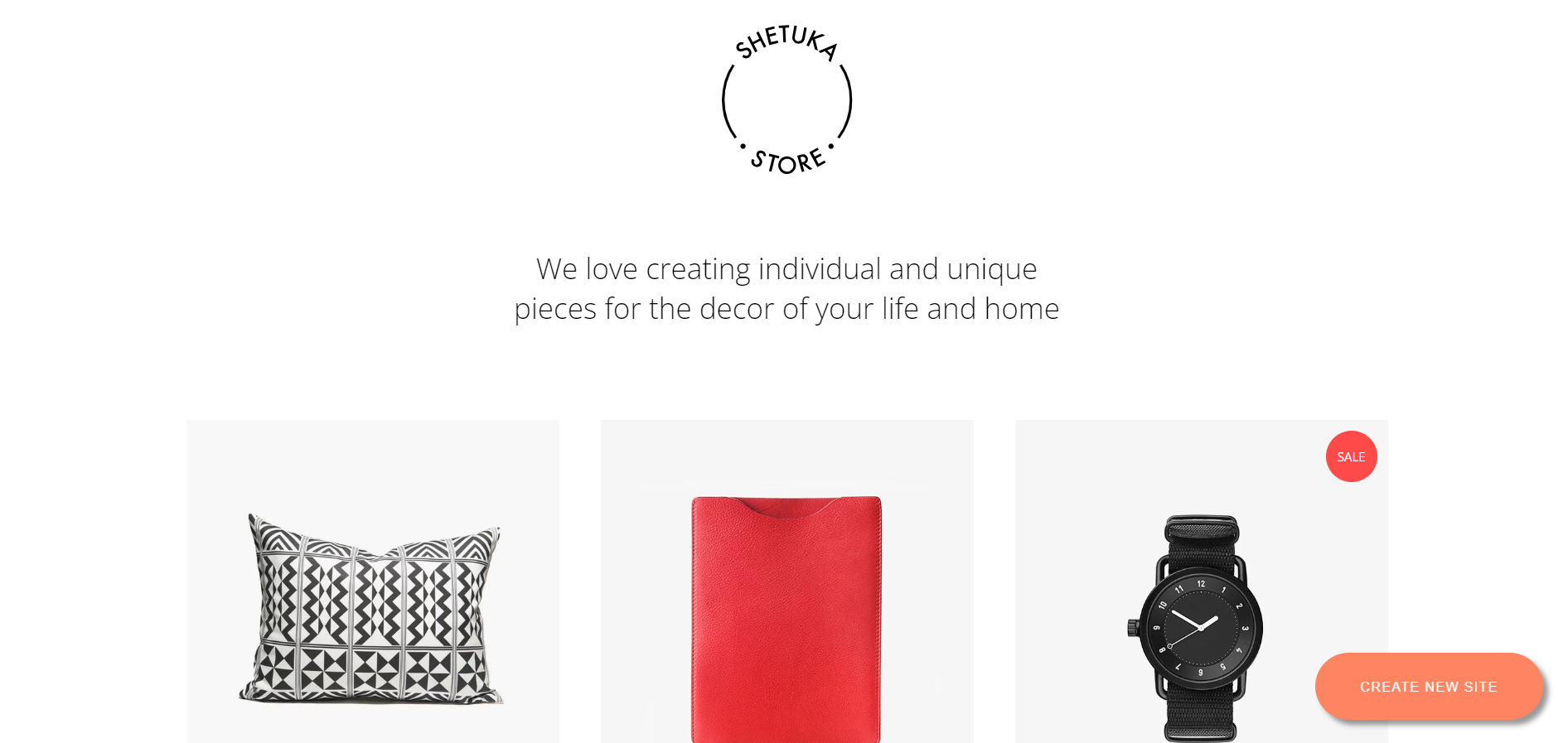
Get a head start on website creation with AI
Create a custom website tailored to your business needs 10X faster with 10Web AI Website Builder!
Ease of use
Ease of useReflects the platform’s overall user-friendliness.Score
Components:
- Learning curve (40%): Quickness and ease of getting started.
- Interface design (30%): Simplicity and intuitiveness of layout.
- User guidance (20%): Quality of tutorials and support.
- Flexibility (10%): Adaptability to various user skills.
 7.6
7.6
 8.0
8.0
🏆 Winner: Tilda
. With an ease of use score of 8.0, Tilda edges out iPage, which scored 7.6. Tilda’s intuitive drag-and-drop interface, modern templates, and robust set of features make it a user-friendly choice for website creation. iPage also offers a user-friendly experience with its simple design and drag-and-drop interface, but some users may find its design options somewhat limited compared to Tilda.
Learning Resources
🏆 Winner: iPage
. Both platforms offer a variety of learning resources, but iPage stands out with its comprehensive knowledge base, video tutorials, and step-by-step guides. Tilda also provides detailed articles, tutorials, and video guides, but some users have noted that its customer support could be improved.
For ecommerce
EcommerceMeasures the platform’s effectiveness in supporting online business activities.Score Components:
- Ecommerce themes and templates (20%): Variety and design of templates.
- Product management (25%): Ease of managing and organizing products.
- Payment options (25%): Variety and convenience of payment methods.
- Ecommerce features (20%): Features for managing an ecommerce store.
- Integration (10%): Compatibility with external e-commerce tools and services.
 5.7
5.7
 7.2
7.2
When it comes to ecommerce, Tilda scores higher than iPage, indicating a more robust set of features for online store creation and management. However, both platforms offer a range of ecommerce functionalities suitable for different user needs.

|

|
|
|---|---|---|
|
Ecommerce themes and templates |
5.5 |
6.5 |
|
Product page customization |
5.0 |
7.0 |
|
Payment processing and commissions |
6.0 |
7.5 |
|
POS capabilities |
3.0 |
0.0 |
|
Payment gateways |
6.5 |
7.8 |
|
Product numbers |
4.0 |
6.0 |
|
Additional ecommerce features |
5.5 |
6.5 |
iPage ecommerce features:
- Inventory Management and Tracking
- Coupon Codes and Promotions
- SEO Tools
- PayPal Integration
Tilda ecommerce features:
- Product Catalogs and Inventory management
- Payment Gateways integration
- Shipping options
- Order management
- Built-in CRM and marketing tools
Ecommerce themes & templates
iPage offers a variety of ecommerce-specific templates designed to cater to online stores and businesses. These templates are integrated with features such as shopping carts, product catalogs, and payment processing options to facilitate online transactions. However, the exact number of ecommerce templates available can vary, and users might find some limitations in terms of customization and advanced ecommerce functionalities compared to specialized ecommerce platforms.
On the other hand, Tilda allows users to build their eCommerce sites using around 20 ready-made online store templates, emphasizing ease of use and the ability to create a store without needing coding or web design skills. The platform focuses on providing a seamless online shopping experience, enabling features such as adding items to the cart, viewing product specifications, customizing additional services like delivery, and choosing payment methods.
Product page customization
iPage’s website builder offers a range of ecommerce product page customization options, allowing users to design their storefronts with various templates, adjust layouts, and incorporate multimedia elements like images and videos to showcase products. Users can also edit product descriptions, manage inventory, and set up different payment options. However, limitations may include less flexibility in advanced customization or coding for those who require unique, highly tailored functionalities beyond the provided templates and settings.
Tilda enables a wide range of customizations for product pages in online stores, including the design, e-commerce functionalities, and integration with external services. Features like product variants, delivery options, promotional codes, and diverse payment system integrations allow for a personalized shopping experience. Additionally, Tilda offers content personalization to cater to different customer preferences and backgrounds, enhancing the overall user experience.
Payment processing
iPage supports several payment options for eCommerce, including major gateways like PayPal, Stripe, and others, catering to a wide range of currencies and countries. iPage does not charge commissions for transactions, commissions are charged by the gateways themselves. While iPage offers flexibility in online payment processing, it does not explicitly mention integrated POS capabilities for in-person transactions.
The Tilda website builder supports a variety of popular payment systems such as Stripe, PayPal, and 2Checkout, allowing for easy integration to accept online payments. Tilda does not impose additional transaction fees beyond those of the payment gateways themselves. Tilda does not have POS capabilities, Tilda’s focus is on online transactions and e-commerce functionalities, with flexibility for “Cash on Delivery” options.
Website Editors
Website EditorsEvaluates the platforms’ website building and editing capabilities.Score Components:
- Customization tools (40%): Range and power of editing features.
- Editor usability (30%): User experience within the editor.
- Design flexibility (20%): Freedom in layout and design changes.
- Update and maintenance ease (10%): Simplicity of updating and maintaining the site.
 6.8
6.8
 8.0
8.0
🏆
Winner: Tilda
. Tilda, with a score of 8.0, offers a user-friendly, block-based design approach that simplifies the process of creating websites without requiring in-depth coding knowledge. It features advanced customization options through its Zero Block feature, allowing for detailed control over design elements for those needing more specific layouts. The platform supports responsive design, ensuring websites are optimized for all devices, and includes built-in SEO tools, analytics, and a range of integrations with third-party services for extended functionality.
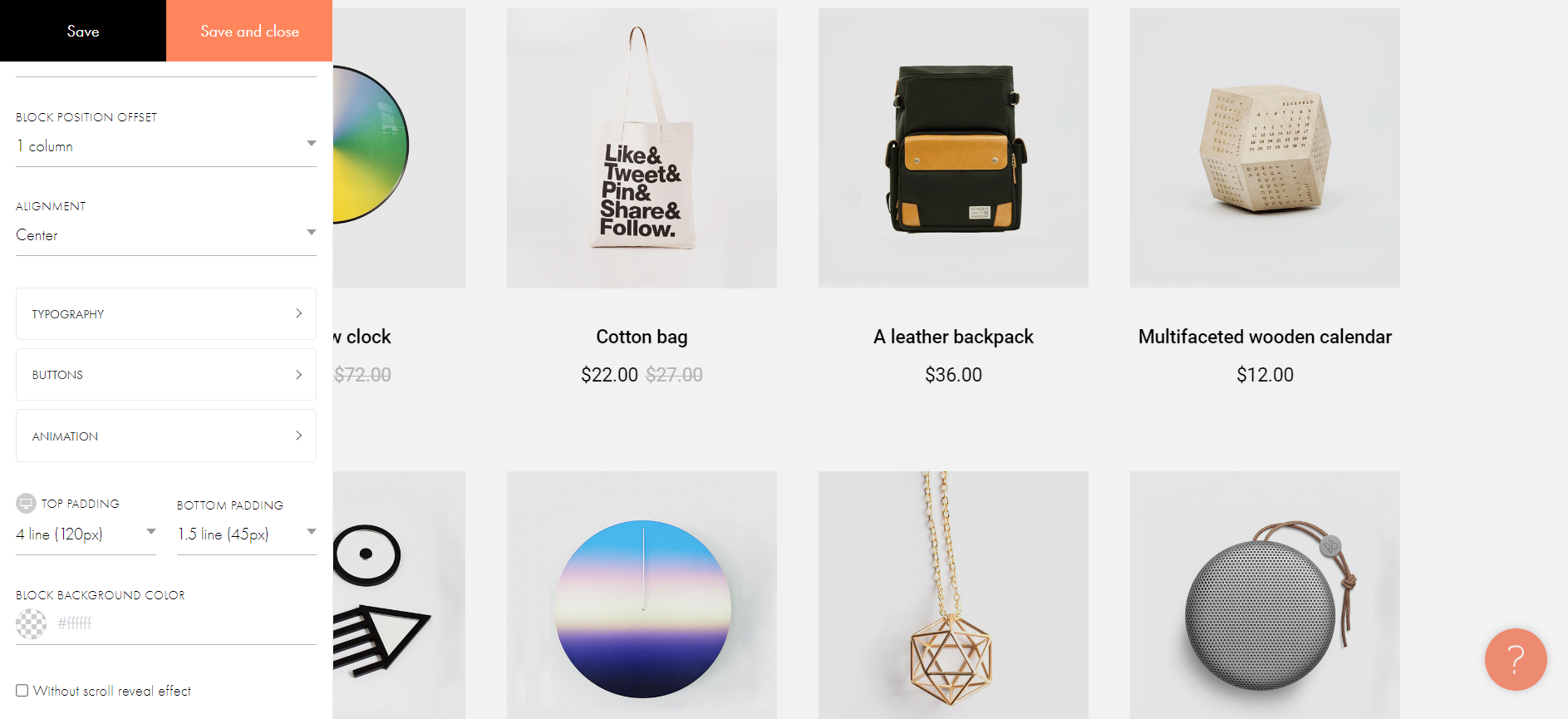
iPage’s website builder editor, scoring 6.8, is designed for ease of use, catering to both beginners and those with some web design experience. It offers a drag-and-drop interface, allowing users to easily add, remove, and customize elements on their web pages without needing to code. Users can choose from a variety of templates that are responsive and customizable to fit their brand or personal style. Additionally, the editor includes features for adding social media links, integrating e-commerce functionalities, and optimizing for search engines, making it a versatile tool for creating a wide range of websites.
Mobile editor/app
 5.0
5.0
 5.5
5.5
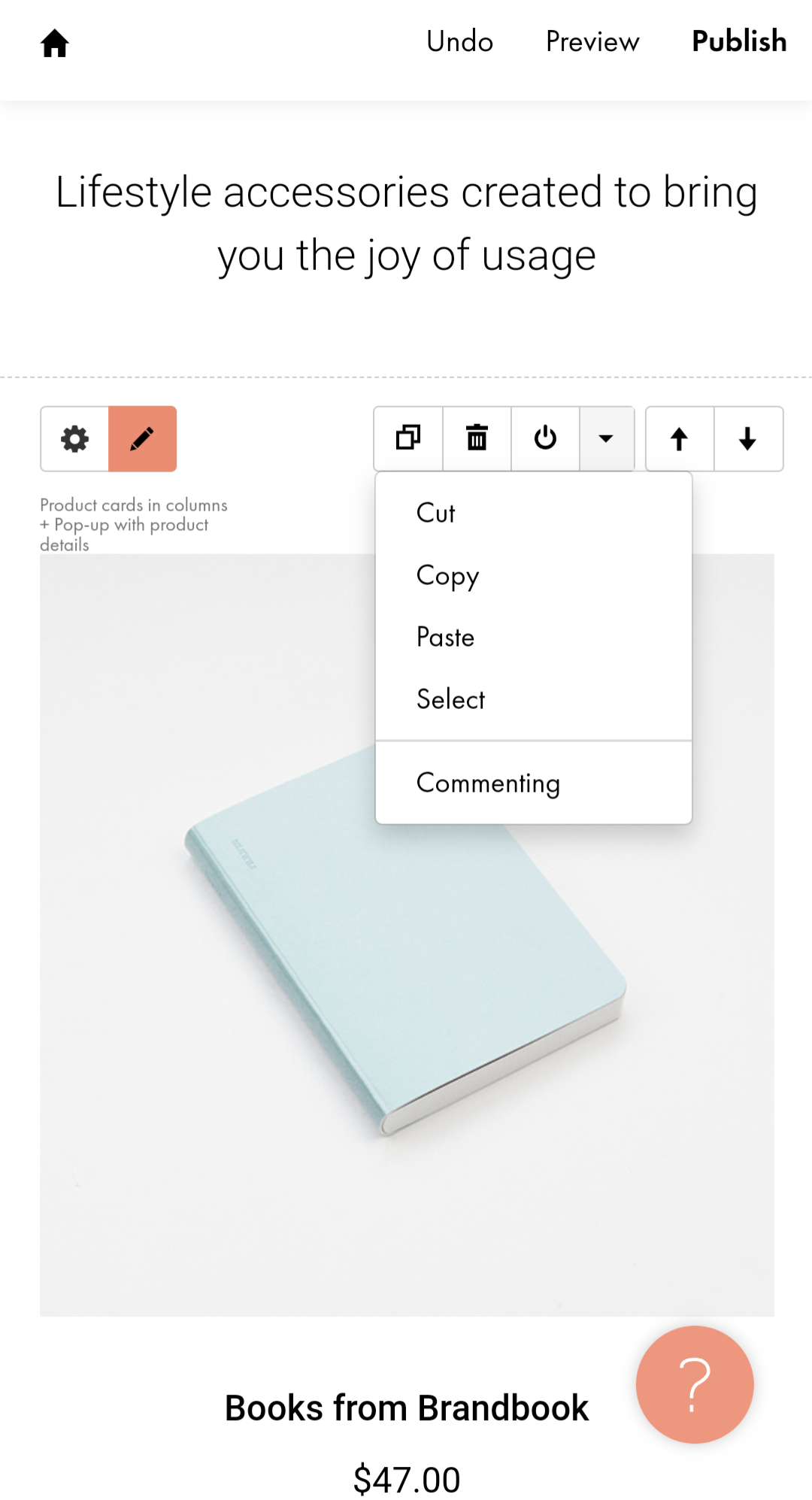
🏆
Winner: Tilda
. Both iPage and Tilda do not have a dedicated mobile editor app. However, they allow users to manage and edit their websites using the mobile browser version of the editor. This feature provides convenience for users who need to make quick changes or updates to their websites on the go. Despite the similarities, Tilda has a slightly higher mobile editor score than iPage, making it the winner in this category.
Product testing options
Product Testing OptionsAssesses the options for trying out platform features before commitment.Score Components:
- Trial quality (40%): Extent and usefulness of the trial or free version.
- Feature accessibility (30%): How many features are available to test.
- Trial duration (20%): Length of the trial period.
- Ease of transition (10%): Smoothness of moving from trial to paid plans.
 2.5
2.5
 5.9
5.9
Overall Result
:
Tilda Wins
. Tilda scores 5.9, significantly higher than iPage’s 2.5 in product testing options. Tilda offers a free version and allows testing of some premium features, while iPage does not offer a free or trial version. However, iPage allows testing of all features during a 30-day refundable period.

|

|
|
|---|---|---|
|
Free Plan |
No |
Yes |
|
Trial Duration |
No trial | No trial |
|
Testing Premium Features |
All features during refundable period |
Some features with the free plan |
|
Money Back Guarantee |
30-day money back guarantee |
No |
Price
PriceLooks at the cost-effectiveness and value for money of each platform.Score Components:
- Plan value (40%): What each pricing tier offers.
- Transparency and clarity (30%): Clearness of pricing structures.
- Flexibility of plans (20%): Range of options to suit different budgets.
- Hidden costs (10%): Additional expenses not included in the plan.
 7.3
7.3
 8.0
8.0
Tilda offers a higher price score and more affordable plans compared to iPage.
Both platforms offer significant discounts for annual subscriptions, with iPage offering up to 80% off depending on the plan, and Tilda offering between 20% and 30% off depending on the plan. Neither platform offers an enterprise plan.

|

|
|
|---|---|---|
|
Free |
No offering at this amount. |
Free ($0/month): Tilda’s Free plan allows for 1 website with up to 50 pages per website and 50 MB of space per project. It includes a free subdomain on tilda.ws, responsive design on all devices, basic animations, a built-in image and icon library, and Tilda CRM. |
|
$10-$20 |
Basic ($15.99/month): Simple website or blog, 1 website, 10 GB SSD, free domain, managed WordPress, free SSL for 1st year. Value for price: 6.5 |
Personal ($15/month): The Personal plan offers 1 website with up to 500 pages and 1 GB of space. It includes all features of the Free plan plus the ability to connect a custom domain, advanced animations, full access to the Block Library, analytics, SEO tools, and online store capabilities. Value for price: 7.5 |
|
$20-$30 |
Choice Plus ($27.99/month): Multiple sites with storage, security, backups, 3 websites, 40 GB SSD, daily backups, domain privacy, malware scanning. Value for price: 7.5 |
Business ($25/month): The Business plan expands capabilities to 5 websites per account, each with up to 500 pages and 1 GB of space, including source code export and API access. It builds upon the Personal plan features with additions suitable for more extensive business needs. Value for price: 9.0 |
|
$30-$34 |
Online Store ($32.99/month): Online selling with eCommerce tools, 3 websites, 40 GB SSD, store features like unlimited products and secure payments. Value for price: 8.0 |
No offering at this amount. |
|
$34+ |
Pro ($34.99/month): High traffic sites, advanced storage, 5 websites, 100 GB SSD, optimized for high traffic, enhanced security and backups. Value for price: 9.0 |
No offering at this amount. |
location. As a result in rare cases the prices displayed here can differ from the ones you see on their
websites.
Hosting quality
Hosting
qualityExamines the reliability and performance of the hosting solutions.Score Components:
- Uptime (40%): Consistency and reliability of website availability.
- Speed (30%): Loading times and performance.
- Bandwidth and storage (20%): Sufficiency of resources provided.
- Data centers (10%): Quality and distribution of hosting infrastructure.
 7.7
7.7
 6.2
6.2
🏆
Winner: iPage
iPage offers a range of affordable hosting services including shared, WordPress, and VPS hosting, with unlimited storage and bandwidth for various website needs. Tilda, on the other hand, offers cloud hosting with up to 1GB storage capacity. Both platforms have an uptime of 99.9% but neither offers an uptime guarantee. iPage has data centers in the US and Europe, while Tilda does not disclose the locations of its data centers.

|

|
|
|---|---|---|
|
Do they offer hosting? |
Yes |
Yes |
|
Data Centers: |
2: US, Europe |
Not disclosed |
|
Type of hosting: |
Managed WordPress Hosting |
Cloud Hosting |
|
Uptime: |
99.9% |
99.9% |
|
Uptime Guarantee: |
No |
No |
Website Speed Optimization
Website Speed OptimizationEvaluates optimization of website loading timesScore Components:
- PageSpeed Score (30%): Google’s score indicating performance optimization.
- Loading Time (30%): The average time until a website is fully interactive.
- Mobile Optimization (15%): Optimization effectiveness for mobile devices.
- Resource Optimization (15%): Optimizing images, scripts, and other heavy resources.
- CDN Usage (10%): Use of CDN to enhance speed across geolocations.
 7.4
7.4
 4.9
4.9
🏆 Winner: iPage
Both iPage and Tilda have strategies in place for website speed optimization, but iPage takes the lead with a more comprehensive approach and better performance metrics.

|

|
|
|---|---|---|
|
Focus |
Web Server optimizations, Caching, CDN, Database optimization, SEO optimization |
Lazy Loading, Image Optimization |
|
Performance Tools |
Google Lighthouse, PageSpeed Insights |
Google PageSpeed Insights |
|
Key Strategies |
Web Server optimizations, Caching, CDN, Database optimization, SEO optimization |
Lazy Loading, Image Optimization |
|
Load Times |
2.6s average |
Varies depending on optimization and website complexity |
|
Page Speed Scores Range |
72/100 average |
Varies depending on optimization and website complexity |
|
Core Web Vitals Improvement |
LCP, FID, CLS improvements |
No information provided |
iPage, a user-friendly web hosting and site builder platform, offers a comprehensive approach to website speed optimization. It focuses on web server optimizations, caching, CDN, database optimization, and SEO optimization. iPage has an average load time of 2.6 seconds and an average PageSpeed score of 72/100. It also emphasizes improvements in Core Web Vitals, including LCP, FID, and CLS.
On the other hand, Tilda, a web-based platform designed for creating websites, landing pages, and online stores, focuses on lazy loading and image optimization for website speed optimization. However, Tilda does not provide specific information on their load times, PageSpeed scores, or Core Web Vitals improvements, stating that these vary depending on optimization and website complexity.
Get a head start on website creation with AI
Create a custom website tailored to your business needs 10X faster with 10Web AI Website Builder!
Plugins and integrations
Plugins and integrationsMeasures the range and effectiveness of additional plugins and integrations.Score Components:
- Variety of options (40%): Range of available add-ons.
- Integration smoothness (30%): Ease of integrating plugins into the site.
- Quality of plugins (20%): Functionality and reliability of the options.
- Custom integration capabilities (10%): Support for custom or third-party integrations.
 6.3
6.3
 7.6
7.6
🏆 Winner: Tilda.
Tilda scores 7.6, offering a diverse range of integrations that enhance the functionality of websites created on its platform. It supports popular payment processors, integrates with various services for analytics, email marketing, and payment solutions, making it a versatile tool for building and managing online projects. iPage, with a score of 6.3, also offers a variety of plugins and extensions, but Tilda’s wider range of integrations gives it the edge.
Marketing Features
Design FunctionalitiesRepresents how well each platform allows for creative design and customization of websites.Score Components:
- Template Variety (30%): Range and quality of design templates.
- Customization (30%): Flexibility and options for design alterations.
- User Interface (20%): Ease and intuitiveness of the design process.
- Responsiveness (10%): Adaptability to different devices and screen sizes.
- Innovation (10%): Unique design features and tools.
 7.2
7.2
 6.9
6.9
🏆
Overall Winner: iPage
. iPage stands out for its comprehensive marketing tools, including SEO, email marketing, blogging, social media integration, analytics and reporting, and ads and promotions. Tilda, while strong in SEO, email marketing, blogging, social media integration, and analytics and reporting, lacks in ads and promotions.

|

|
|
|---|---|---|
|
SEO Tools |
|
|
|
Email Marketing |
|
|
|
Blogging |
|
|
|
Social Media Integration |
Integrated social media buttons and features |
Easy linking and social post creation |
|
Analytics and Reporting |
Option to integrate Google Analytics |
Integration of Google Analytics |
|
Ads and Promotions |
Offers SEO, social media integration, email marketing, and promotional discounts |
X |
Customer Support
Customer supportEvaluates the quality and availability of support options.Score Components:
- Response time (40%): Speed of support responses.
- Support quality (30%): Effectiveness and helpfulness of the support.
- Availability (20%): Range of support channels (phone, chat, email).
- Resource richness (10%): Quality of self-help and educational materials.
 6.9
6.9
 5.5
5.5
🏆 Winner: iPage
. In the iPage vs Tilda comparison, iPage takes the lead with its 24/7 customer support availability. iPage offers assistance through phone, email, and live chat, ensuring that users can get help at any time, day or night. This round-the-clock support is particularly beneficial for users who may encounter issues outside of regular business hours.
Tilda, on the other hand, primarily provides support via email and encourages users to utilize its comprehensive Help Center for self-help. While Tilda’s support resources are useful, the lack of specified support hours and limited direct support options make it less accessible compared to iPage’s robust support system.
Security
SecurityLooks at the platforms’ security measures and data protection.Score Components:
- Data protection (40%): Safeguards for user and customer data.
- SSL and encryption (30%): Implementation of secure connections.
- Compliance (20%): Adherence to industry security standards.
- Regular updates (10%): Frequency of security updates and patches.
 7.5
7.5
 7.6
7.6
🏆
Winner: Tilda
. Tilda edges out iPage with a slightly higher security score and a comprehensive approach to data protection and website security. Tilda’s commitment to GDPR compliance, DDoS prevention, and HTTPS encryption ensures that user data is well-protected. Additionally, Tilda’s use of cloud storage and a Content Delivery Network (CDN) enhances both the security and performance of websites built with its platform.
iPage also offers robust security features, including Domain Privacy Protection and SiteLock, a comprehensive security suite designed to protect websites from malware, spam, and hackers. However, it falls slightly short of Tilda in terms of overall security score.
AI Capabilities
AI capabilitiesMeasures the effectiveness of AI-driven features and tools.Score Components:
- Automation efficiency (40%): Impact of AI on streamlining processes.
- Personalization (30%): AI-driven customization for users or customers.
- AI-Assisted design (20%): Role of AI in website design and functionality.
- Data analysis (10%): Use of AI in interpreting user data and analytics.
 3.0
3.0
 2.1
2.1

|

|
|
|---|---|---|
|
AI Website Builder |
iPage offers an AI-powered website builder |
|
|
AI Ecommerce Features |
|
|
|
AI Content Generation |
|
Tilda has an AI feature for generating website content |
🏆 Winner: iPage
. iPage, with a score of 3.0, offers an AI-powered website builder, making it easy for users to create and customize their websites without needing extensive technical knowledge. However, it lacks AI content generation tools and AI-powered ecommerce features.
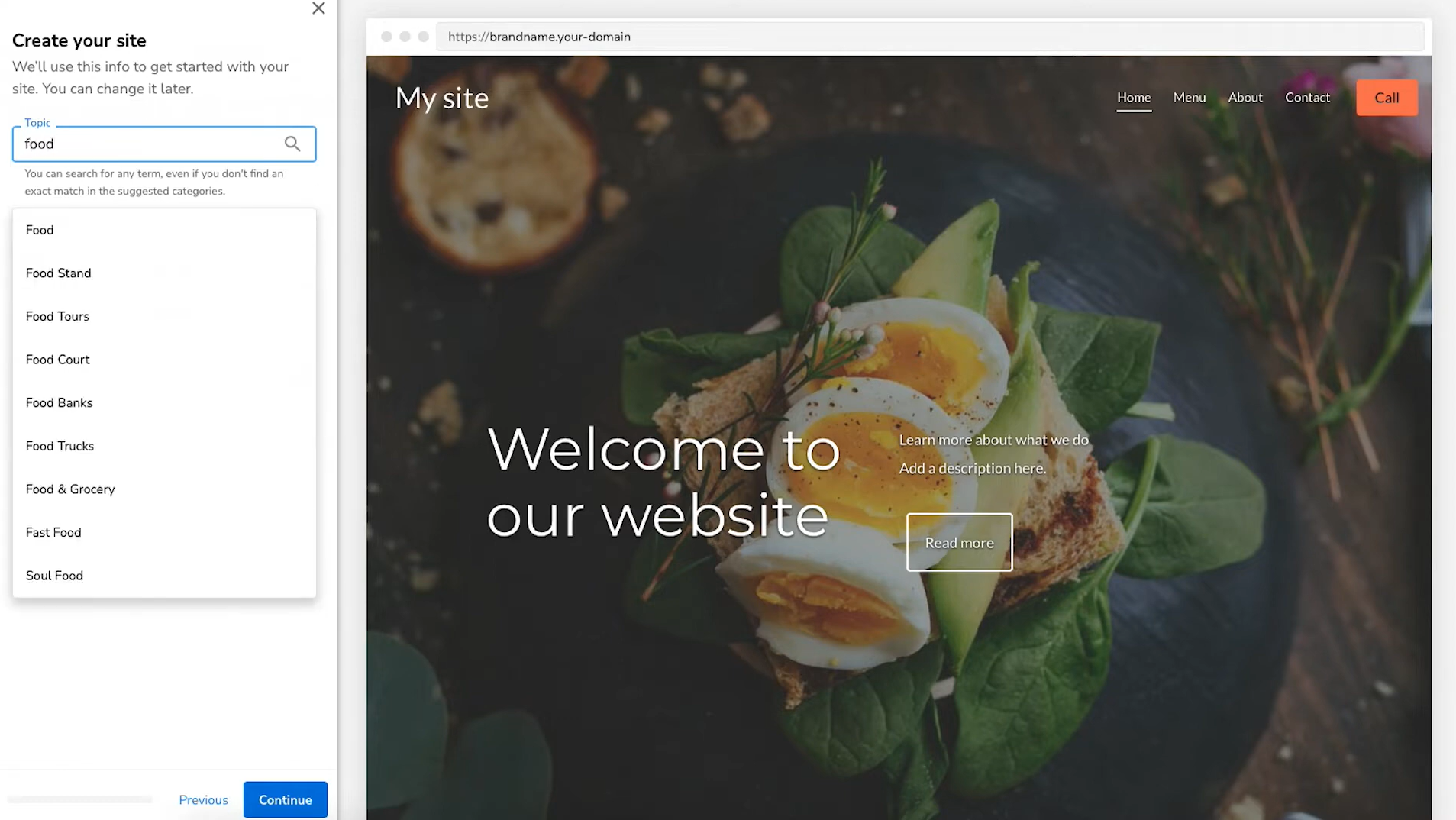
Tilda, with a score of 2.1, does not have an AI website builder or AI ecommerce features. However, it does have an AI feature for generating website content, including headlines and text blocks, accessible through the Page Editor.
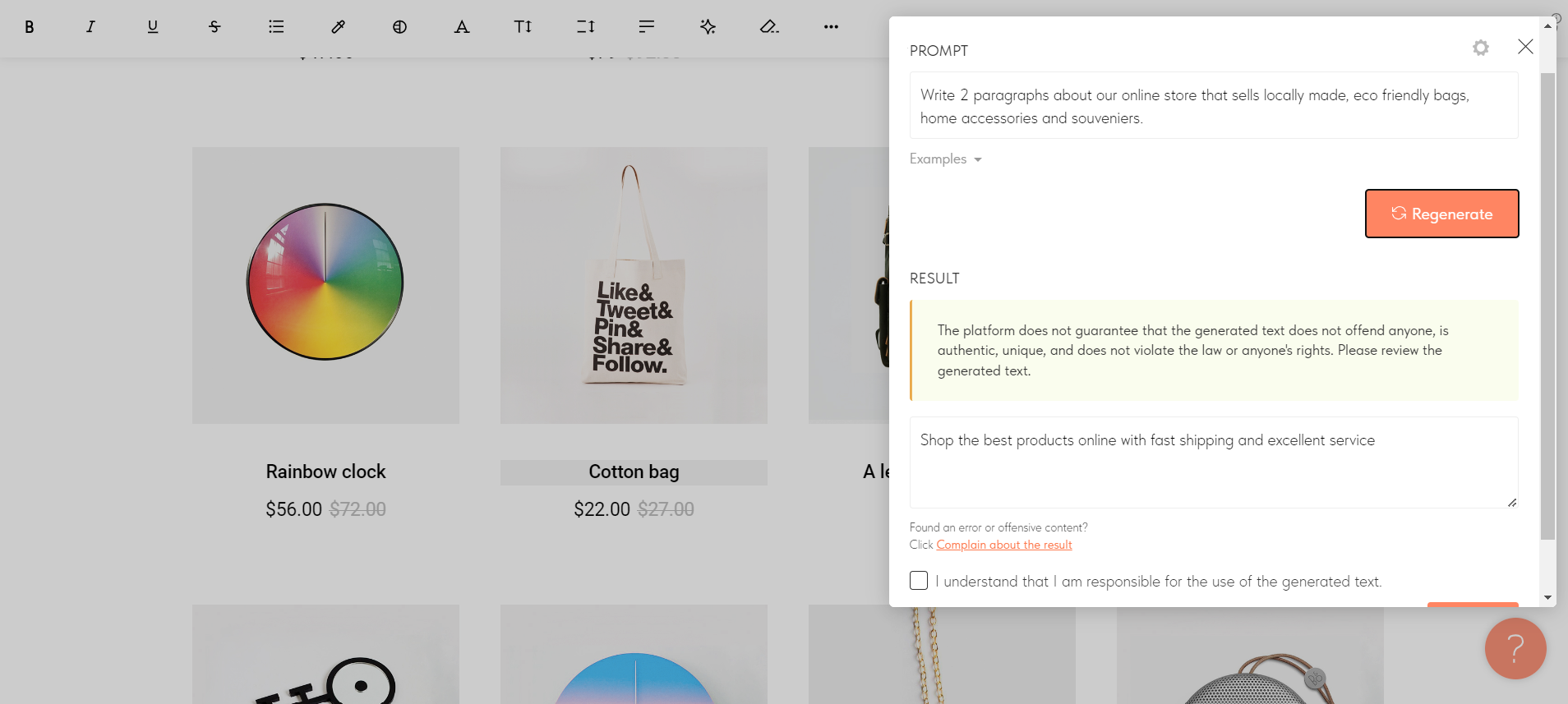
User Management
User ManagementAssesses the platforms’ capabilities in managing user roles, permissions, and accessibility.Score Components:
- Role Customization (40%): Flexibility in creating and defining user roles and
permissions. - Ease of Management (30%): User interface and tools for managing users.
- Access Control (20%): Effectiveness of access control measures for different user
levels. - Scalability (10%): Ability to manage a growing number of users efficiently.
 3.2
3.2
 7.3
7.3
🏆 Winner: Tilda
. Both iPage and Tilda offer different levels of user management capabilities.
- iPage’s website builder offers very limited multi-user functionality and access levels compared to more sophisticated website builder platforms.
- Tilda, on the other hand, offers a Collaborators feature that allows adding teammates with either Full or Limited access. Full access enables collaborators to edit, publish, delete pages, view requests and statistics, and make changes to built-in website services. Limited access allows the project owner to specify what actions the collaborator can perform. This feature is available as a premium offering, and adding more collaborators requires additional payment, with costs adjusted based on previously paid periods. It applies to the entire account, not individual projects, and collaborators can be managed or replaced through the Site Settings.
Unfortunately, neither iPage nor Tilda provided a detailed user roles and access levels table.
Additional Features

|

|
|
|---|---|---|
|
SSL Certificate |
|
|
|
Custom Domain |
|
|
|
Free Custom Domain Included |
|
|
|
International Domains |
|
|
|
Mobile Responsive |
|
|
|
Page Speed |
|
|
|
Website Builder Mobile App |
|
|
|
Convert a Website To An App |
|
|
|
Website Analytics |
|
|
|
Multilingual Sites |
|
|
|
Multiple Users |
|
|
iPage vs Tilda: User Feedback
Tilda Publishing receives varied feedback from users, highlighting its strengths in offering a no-code, customizable website building experience with features like Zero Block for personalization and easy backend setup. Users appreciate its affordability, user-friendly interface, and responsive customer support. However, criticisms include buggy font customization, limited design elements, and instability in some of its features. Despite these drawbacks, many find Tilda beneficial for creating professional websites quickly and managing multiple sites under one plan, although some users advise caution due to issues with stability and customer support.
In contrast, iPage does not have a detailed user feedback summary available. This absence of specific user reviews makes it challenging to directly compare user satisfaction between iPage vs Tilda. However, iPage’s focus on providing comprehensive services including hosting, domain registration, and e-commerce solutions, particularly for small businesses and personal projects, suggests a user base that values an all-in-one platform for their web hosting and site-building needs.
The making of this blog
We followed a clear, step-by-step process to write and research this article.
iPage vs Tilda: FAQ
Which platform is better for beginners, iPage or Tilda?
Can I use both iPage and Tilda for ecommerce?
How do iPage and Tilda differ in terms of design flexibility and customization?
What are the major differences in pricing between iPage and Tilda?
Which platform offers better customer support, iPage or Tilda?










